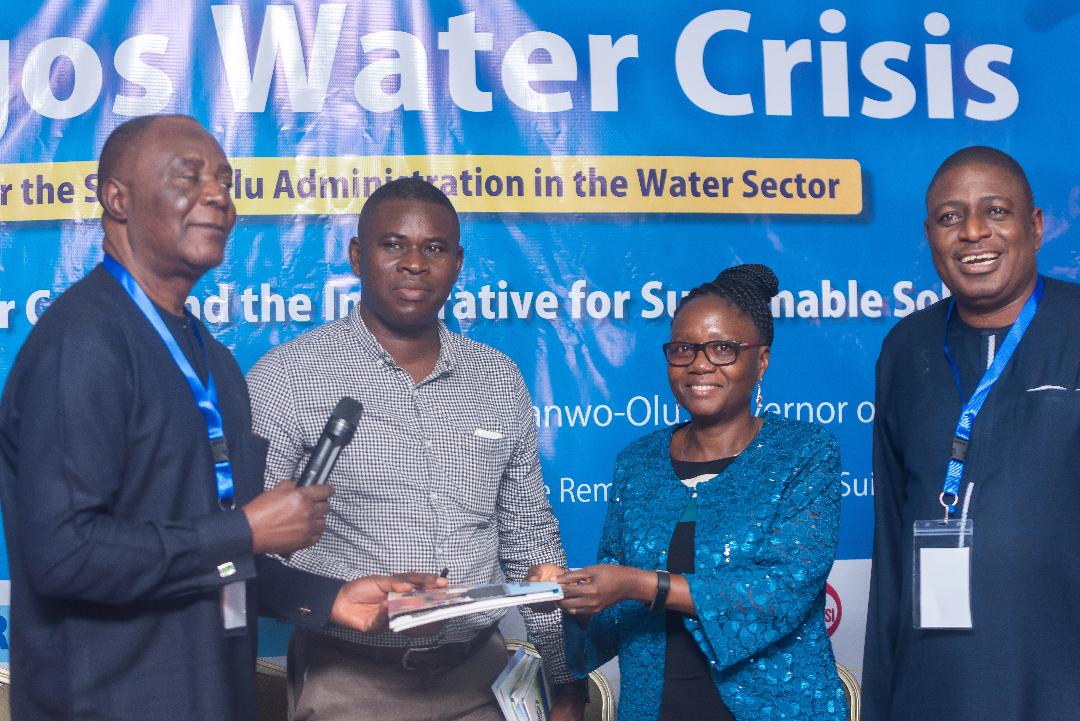
Veteran unionist, Comrade Sylvester Ejiofor (left); representatives of Lagos Ministry of Environment and Water Resources, Engr. M.A. Yinusa and Mrs. Hellen Taiwo and ERA/FoEN Deputy Executive Director, Akinbode Oluwafemi at the stakeholders dialogue and presentation of Lagos Water Crisis: Alternative Roadmap for Water Sector document to the state government
Organised labour and rights activists have urged the Lagos State government, other states of the federation and the Federal Government to provide safe, clean and affordable drinking water to Nigerians through the public sector.
They specifically tasked the Governor Babajide Sanwo-Olu administration to jettison public private participation (PPP), otherwise known as privatisation of the state water sector, but also build the political will to fulfill the fundamental human right of Lagosians through the public sector.
This was the submission of the Environmental Rights Action/Friends of the Earth Nigeria (ERA/FoEN), Corporate Accountability, Public Services International (PSI), Transnational Institute and the Amalgamated Union of Public Corporations, Civil Service, Technical and Recreational Services Employees (AUPCTRE), among others at a stakeholders dialogue on Lagos water crisis.
The objectives of the dialogue include, but not limited to advancing real solutions to the Lagos Water Crisis, how to engage the Lagos State government on solutions to the water crisis, and how to strengthen the Our Water, Our Right Coalition.
In his keynote address titled: “The Lagos Water Crisis and the Imperative for Sustainable Solutions,” Country Director of Plan International Nigeria, Dr. Hussaini Abdu, argued that everyone was entitled to sufficient, safe, acceptable, physically accessible and affordable water for personal and domestic use without discrimination.
He said this covers water for drinking, personal sanitation, washing of clothes, food preparation and personal and household hygiene.
Other speakers who stressed the need for government to provide affordable water to the citizens are, Nnimmo Bassey and Oluwafemi Akinbode of ERA/FoEN, Benjamin Anthony of AUPCTRE, Leslie Adoghame of Sustainable Research and Action for Environmental Development (SRADeV), Vicky Urenma Onyekwuru of Child Health Organisation.
Specifically, Akinbode argued that government has privatised power, health, education, public road transportation and other services, which should necessarily be managed as essential social services by governments, insisting that if the people allow the Lagos State government to privatise water, “the next move would be to package air for sale to the poor masses.”
They sought an investigation of all loans and funding for the existing water system and infrastructure in Lagos State throughout the tenures of the Governors Babatunde Fashola and Akinwunmi Ambode, as well as the N1.6b given to the Lagos Water Corporation (LWC) in 2017 for the rehabilitation of mini and micro waterworks across the state.
Other demands are, that the Lagos government rejects all advisory contracts, PPP and privatisation success myths promoted by the World Bank, International Finance Corporation (IFC) and other multinational donor agencies;
That the Lagos government adopts proven public solutions in the water sector including the Public ion Partnership model and a National Water Trust Fund, as outlined in the way forward document titled: “Lagos Water Crisis: Alternative Roadmap for Water Sector;
That community at the grassroots level, Community Development Associations (CDAs), women and vulnerable groups be fully integrated into the Lagos State government’s mainstream plans to resolve the state’s water crisis;
That the Freedom of Information Act (FOIA) be utilised in the public demand of information on funds sourced and approved for public water projects in the last three decades; and
That there should be an adequate budgetary allocation for the water sector, which ensures transparency and accountability in the use of such appropriated funds.
They, therefore, vowed to resist every move aimed at privatising water, which they said, is an existential resource and an essential natural need of mankind.
 The New Experience Newspapers Online News Indepth, Analysis and More
The New Experience Newspapers Online News Indepth, Analysis and More
